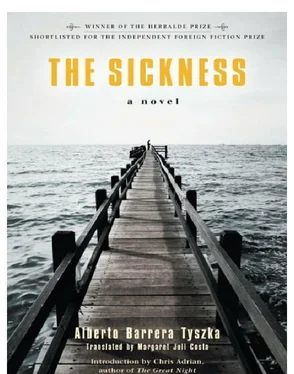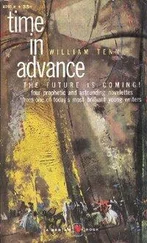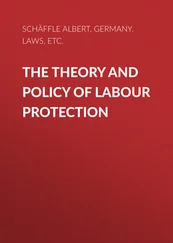“You didn’t dare,” he muttered hoarsely.
“No.”
“You had thousands of opportunities. We were together on beaches, we slept in the same room. .”
“I couldn’t do it. Whenever I tried to tell you, I just couldn’t.”
“But you could now,” added his father somewhat resentfully.
“Yes, I don’t know what came over me. But that certainly wasn’t how I wanted to tell you. I’m sorry.”
Very slowly, his father turned round. Andrés could see that his eyes were wet with tears and that beneath those tears lay something resembling both melancholy and rancor, some emotion for which the dictionary did not yet have a word.
“I’m sorry,” Andrés murmured again, as if he could go on repeating those words for the rest of the journey. As if those were the only words he had to hand, the only ones left to him.
Still keeping his distance, his father said: “All this makes me think that it’s not something straightforward.” He looked at him with eyebrows raised interrogatively. “If it was nothing very serious, you wouldn’t have found it so hard, we wouldn’t have come on this trip.”
“Yes, it’s serious,” mumbled Andrés awkwardly.
“Say that again.”
This was an order.
“Say that again. Tell me that it’s ‘serious.’ Tell me the whole truth now.”
They both fell silent, looking at each other. How long did they stand like that? His memory doesn’t tell him. That is one thing he can’t remember. He only has that frozen image of them, studying each other, saying nothing. Until an acid teardrop cuts the image in two, from top to bottom, like a knife, tearing the scene apart. Andrés could no longer hold back his tears. However hard he blinked, he couldn’t do it: that was his response. Like a confused and cornered child, forced to accept that there’s no way out. He could barely manage a mumbled “Forgive me, Dad,” his voice broken by sobs.
Javier Miranda stared at him, astonished, overwhelmed. He appeared to be trembling or trying hard to keep his body from trembling. He bowed his head, turned, and walked off into the shadows.
They got into the car in silence, left the port and drove up the motorway to Caracas still in silence. On two or three occasions, Andrés tried to start a conversation, but received no response. His father remained mute throughout the journey, staring straight ahead. Andrés imagined that the news had left him paralyzed, that he was still taking in that information, as invasive as a scalpel. When they stopped outside his father’s apartment building, Andrés got out to help him take his suitcase from the trunk. Then he made to accompany him to the door, carrying the suitcase, but his father stopped him.
“Thanks, I can do it,” he said in an oddly gentle tone.
Still wrapped in that same silence, he set off toward the door. Andrés watched him, every nerve tensed. When he could stand it no longer, he shouted:
“Would you have preferred not to know?”
His father stopped, but didn’t turn to look at him.
Andrés asked again: “Would it have been better if I hadn’t told you?”
His father stood for a moment as if pondering the question, as if the question were a peach pit under his tongue. Then, sadly, he went up to the door and into the building. Without saying a word. Without turning round. Why should this happen to me? Why me? Ever since that night, Javier Miranda keeps asking these questions over and over. As if it were a personal matter, as if he were addressing nature’s complaints department and had sat down to talk to the manager. Why me? Why should this happen to me? — while he submits to more tests, more examinations. Why me? Why should this happen to me? — when the oncologist speaks to him in incomprehensible jargon. Why me? Why should this happen to me? — as he starts a new session of chemotherapy.
“How are you feeling today?” asks the nurse with a smile.
“I’d rather have been run over by a car.”
Ever since that night, everything has changed. First, there’s his state of mind. He can’t shake off the depression that doesn’t so much wrap around him as drench him. He’s angry with life, furious, resentful; he feels powerless, terrified, knowing that there’s no escape. Finally, and in the very worst possible way, when he’s almost seventy, he has learned the cruel meaning of the word “fate.” This is it. That’s all. A syringe. His relationship with his son has changed too. In fact, his relationship with everyone has changed: and that, of course, includes Andrés. He no longer knows how to treat him, what to do, what to say to him. Deep down, he feels sorry for the others, he regrets what’s happening, he’d like to spare everyone else this whole pointless process, this exhausting task. When he sees them, he invariably bows his head. He knows how awkward the situation is for them as well. Perhaps it would all be easier if he tried to look happy, if he pretended, if he behaved as if nothing were happening. Perhaps that would be ideal for everyone, to die discreetly, without anyone noticing, without anyone realizing.
The most marked change, however, is in his body. Javier Miranda feels that he has lost it, that it no longer belongs to him. He has never felt that before, never felt so clearly the stark divide caused by illness. Now he’s dramatically aware of a separation between him and his own body. He is apart, inhabiting a damaged structure, inside a skin he no longer governs, that no longer speaks to him, that has another government now, that does not answer him, that lives for itself and for its own destruction.
Sometimes, at night, before sleeping, he feels this with exasperating clarity. He’s in the bathroom, standing at the mirror, holding his toothbrush, looking at himself. It’s the last ritual of the day. He hasn’t even turned on the light. Only the lamp in the corridor dimly illuminates his image in the glass. He sees it then — so painfully clearly! He can feel its presence in everything — in his hair, in the shine in his eyes, in the color of his skin, even in the shape of his head. The illness is doing something he hadn’t thought possible: it’s taking over his very physiognomy. In the early hours, one Wednesday, after peeing, as he passed the bathroom mirror, he noticed, out of the corner of his eye, the bones beneath the skin, the ever more evident shape of his skull. As if the mirror were an X-ray.
“Who’s coming to fetch you today?” asks the nurse, helping his body to sit down in a chair in the corridor.
“My daughter-in-law,” whispers Javier Miranda.
“Well, I’ll leave you here then,” says the woman. “Now you just sit and wait for her, alright?”
He merely nods sadly, his lips sagging, hanging down toward his jaw. The doctors and the nurses know as well. They don’t talk to him, they converse with his body, with that other creature who has to be treated like an idiot child, with that wound that can barely stand, that will soon collapse completely.
While he waits, a nun walks past him along the corridor. She’s accompanying an old lady who is clearly in the final stages. Perhaps that’s how he looks too. The woman is walking very cautiously, looking fearfully around her. Perhaps she simply wants to escape from this torment, this aseptic horror. The nun by her side is wearing a long, floor-length habit, so that you can’t see her feet. When she walks, she seems to be floating. She’s a nun floating down a hospital corridor. She’s wearing a wooden cross around her neck. Jesus Christ experienced death, he thinks suddenly, but he never experienced illness. The gods die, they don’t fall ill. That’s their advantage.
As soon as he started studying medicine, Andrés Miranda knew that his vocation was not entirely pure. In a way, he always felt incomplete because he didn’t share the other students’ surgical passion; he was more interested in slides and microscopes than in the practical sessions; he preferred the blackboard to the scalpel. While his colleagues couldn’t wait to get down to some practical work, Andrés was happy to postpone that moment. The idea of being in an operating room, dealing with some emergency, didn’t excite him at all. It didn’t repel him either, but it obviously wasn’t the clinical area for which he felt most enthusiasm. He always felt it was a purely personal thing, and felt more drawn to research, to observation and analysis, than to the practical application of medicine. Many years later, reading The Wounded Body , an invaluable philosophical dictionary written by Cristóbal Pera, Andrés at last found the words he had so needed to read during his first years at university: “If we use the war-like language so often used as a global metaphor in surgery, the cruel surgical operation is an act of violence , in which physical force is needed to penetrate the patient’s anatomical space, to subjugate the ‘enemy’—the sickness made concrete in the lesion — to disarm and destroy it.” That definition perfectly described a spirit, an inner attitude that Andrés did not have, had never had. The thought of actually invading another body didn’t thrill him in the least. Even assuming that it was necessary and was an act of salvation , his medical vocation seemed always to be somewhere else, stirred by different impulses. Cristóbal Pera adds: “Surgical violence has created the image of the surgeon’s power over the patient and the latter’s surrender in a ritual of submission.” Nevertheless, for Andrés, the power lay elsewhere, in the space occupied by knowledge. This was his way of coming to terms with what might be considered a weakness. He preferred the knowledge of books to the knowledge of the hands.
Читать дальше












